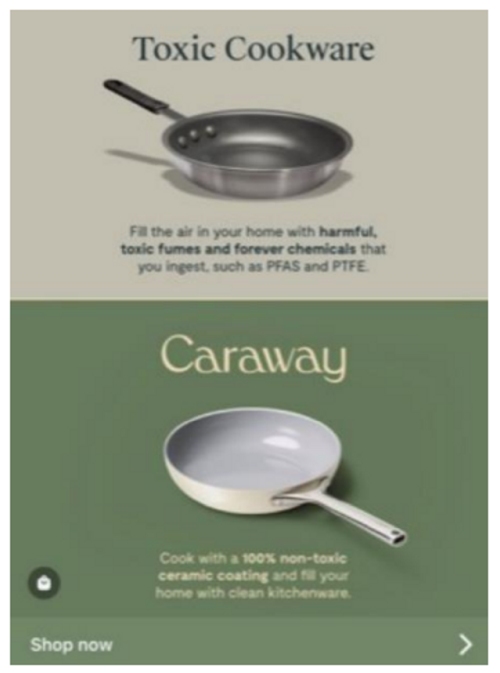- with readers working within the Consumer Industries industries
Caraway Home sells ceramic nonstick cookware. In its advertising, Caraway promoted its cookware as being different from traditional nonstick cookware that is commonly coated with polytetrafluroethylene ("PTFE") – a type of fluoropolymer often referred to as a "forever chemical." Since Caraway's cookware is ceramic coated, it doesn't need to use PTFE to have a nonstick surface.
Caraway made a variety of claims in its advertising that compared its ceramic-coated cookware with traditional nonstick cookware, such as:
- "Most traditional cookware is made with forever chemicals and when they are overheated, they can release those same toxins into your food and home";
- Caraway pans are made from naturally slick ceramic that doesn't release toxins into your food and home";
- "Caraway cookware is made with a non-toxic ceramic coating, so you, your friends and family can all live safe and healthy"; and
- "Make everyday meals healthier without harmful chemicals."
The Cookware Sustainability Alliance, a non-profit educational group made up of cookware companies, challenged Caraway's advertising at the National Advertising Division, alleging that it conveyed the false and unsubstantiated message that traditional non-stick cookware is harmful to consumers.
Caraway argued that its claims were truthful and properly substantiated, due to the well-established fact that the PTFE found in traditional nonstick cookware is known to be toxic, especially to the human digestive system and kidneys.
At the end of the day, Caraway's arguments just didn't stick.
NAD held that although there was various evidence out there about the potential harms of PTFE, Caraway wasn't able to show that "consumers would be exposed to PTFE fumes during ordinary use of traditional nonstick cookware." While Caraway did show that consumers could be exposed to PTFE in certain extreme cooking conditions, NAD held that there is "no evidence in the record that consumers would be exposed to such high temperatures for sufficiently long enough to create a health hazard or how frequently such exposure occurs."
This decision is interesting both for the question it answers – and the question it doesn't. What NAD is really troubled by here is the comparative nature of the advertising. When Caraway advertised that it was PTFE-free in comparison to traditional nonstick cookware, NAD found that the advertising conveyed misleading messages about the health benefits of using ceramic-coated cookware. The decision does seem to suggest, however, that Caraway could still promote the fact that it is PTFE-free in a non-comparative context. It's just not at all clear, though, how NAD thinks it could that without still conveying misleading messages.
Cookware Sustainability Alliance v. Caraway Home, NAD Case No. 7444 (08/04/2025).

This alert provides general coverage of its subject area. We provide it with the understanding that Frankfurt Kurnit Klein & Selz is not engaged herein in rendering legal advice, and shall not be liable for any damages resulting from any error, inaccuracy, or omission. Our attorneys practice law only in jurisdictions in which they are properly authorized to do so. We do not seek to represent clients in other jurisdictions.

